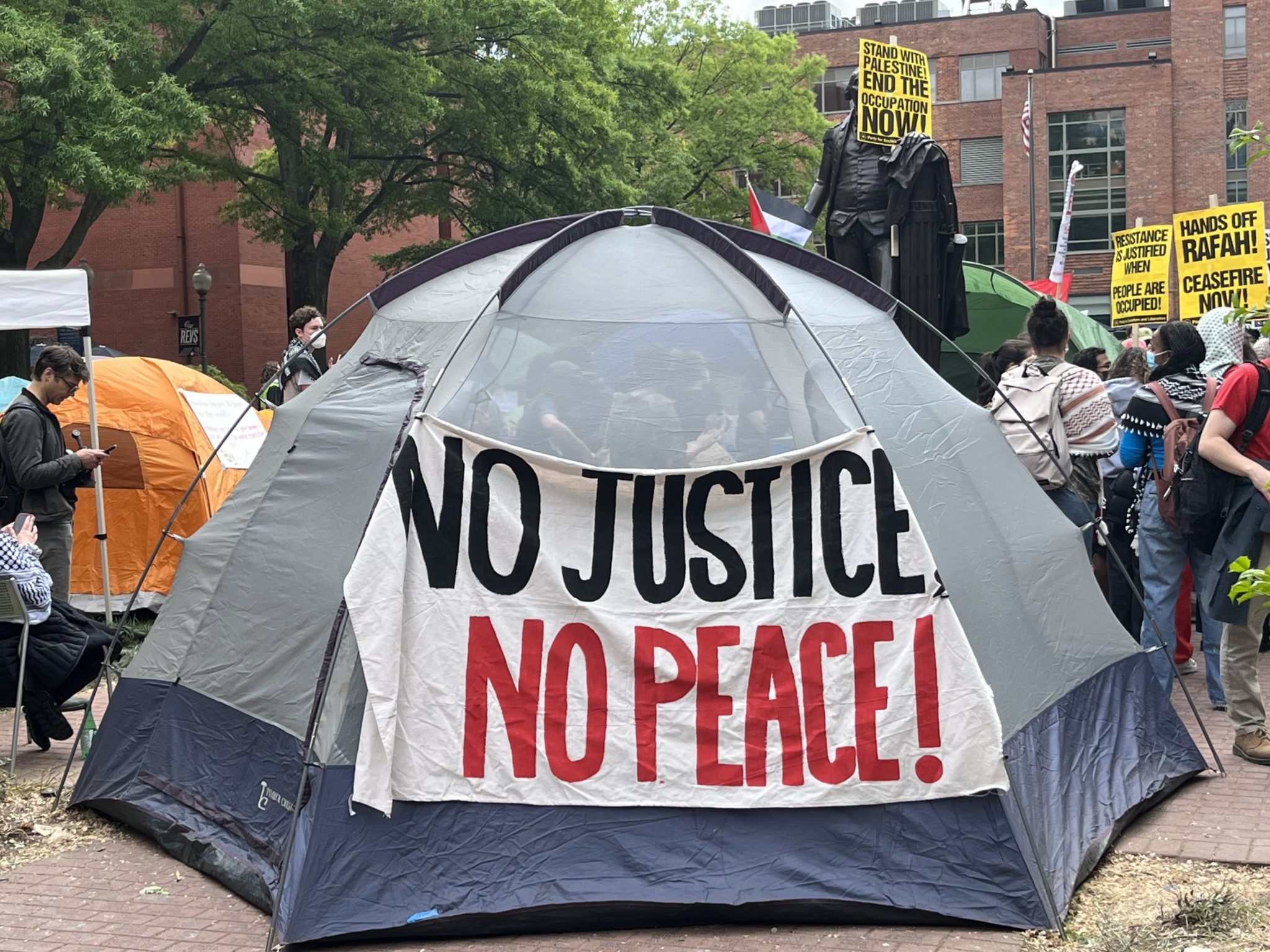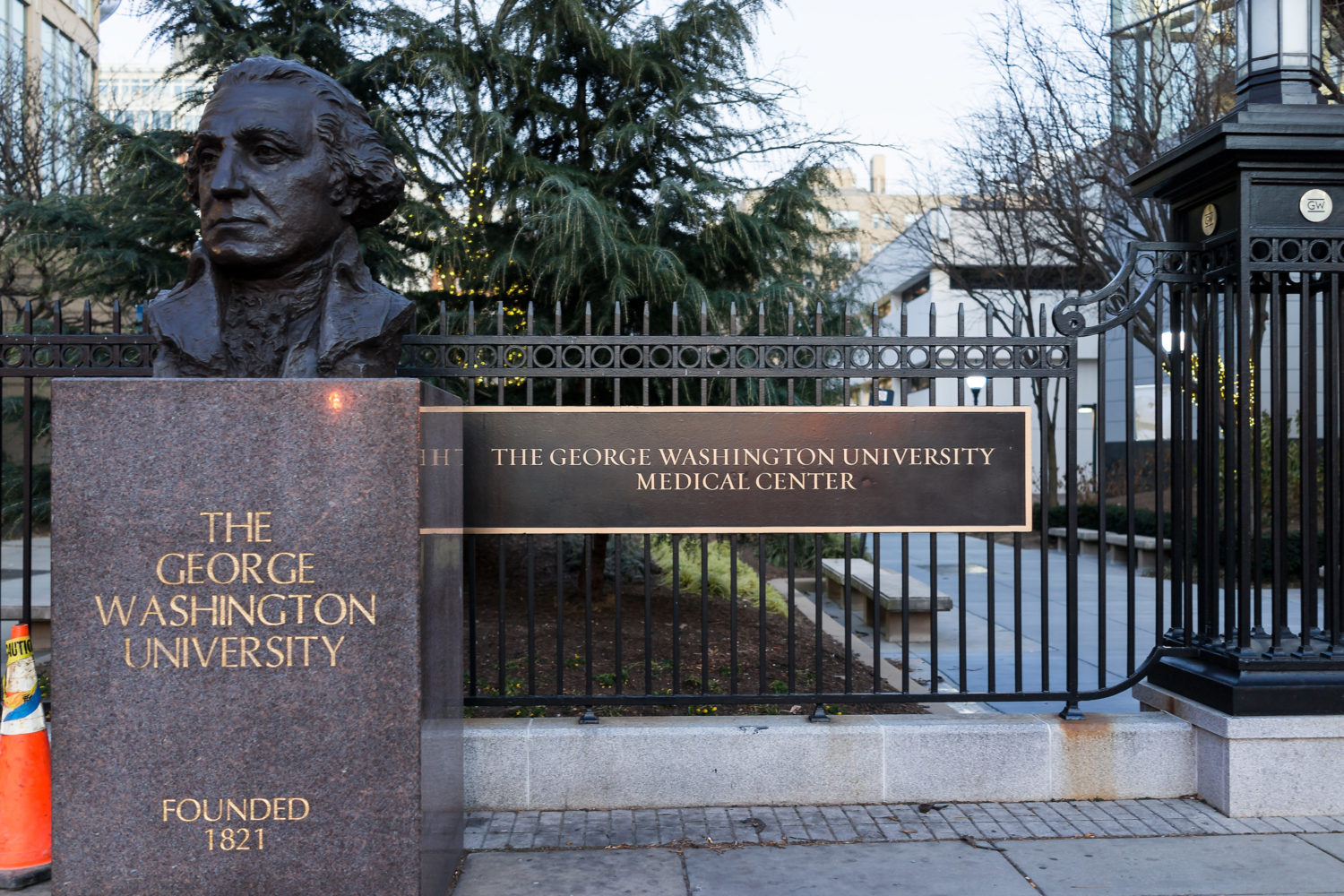Hundreds of DC area university students, faculty, and onlookers gathered at George Washington University on Thursday, as students set up tents and chanted in protest of Israel’s ongoing war in Gaza. The encampment is being organized by the DMV Coalition of Students for Justice in Palestine, which includes students from several local schools, including Georgetown, Howard, University of Maryland, and Gallaudet.
With chants of “from the river to the sea,” Thursday’s protestors said they were there to urge George Washington University’s administration to divest from businesses profiting off of the war in Gaza, as well as to disclose whether the university’s endowment fund had invested in any of those businesses.
Moataz Salim, a GWU graduate student and Palestinian-American, headed to the university’s lawn at 5 AM this morning. Much of his extended family in Gaza had been killed in Israeli airstrikes, he said.
“We’re here to say, they have to divest, they need to protect their pro-Palestine students,” Salim said. “GW has been complicit in the genocide.”
Campuses have long been a hotbed for activism. But few in a generation have been as widespread as those relating to the Israel-Palestine conflict after October 7, 2023, when Hamas forces killed over a thousand Israelis. Since then, over 30,000 Palestinians have been killed in the ensuing war and famine, which some scholars have labeled a genocide.
What’s new this time is the encampments—the pop-up demonstrations with tents, which began at Columbia University earlier this month—as student activists look for a more lasting, in-your-face way to make themselves heard.
“We’re talking about the idea that the university should be for the students, by the students,” Mahmoud Beydoun, a George Washington graduate student, said. “This is our money, we’re paying into the institution…meet us where we’re at.”
But protesters at earlier encampments have met challenges— police arrested over a hundred demonstrators at Columbia’s encampment this week, and similar encampments at USC and Texas also ended in arrests. This afternoon, GW president Ellen Granberg announced that the school had requested the assistance of the MPD to relocate the encampment.
University President Ellen Granberg said GW requested the assistance of MPD to relocate the encampment in a statement released at 2:16 p.m. ⬇️https://t.co/HLDD3n4ceQ
— rory quealy (@rquealy17) April 25, 2024
Many attendees at today’s demonstration hesitated to go on the record with Washingtonian, citing the fear of personal or professional repercussions. One, when approached for an interview, declined, saying that his job was dependent on university grants.
“I understand why people are afraid—they get threats, they get doxxed,” Salim said, adding that he himself had received threats for his activism. “But I’m not afraid to speak up anymore, because I’ve lost over 100 members of my extended family in Gaza, and it’s a genocide.”
At 11 AM today, the scene resembled many college campuses in the springtime, with students on their laptops in the grass, albeit flanked by tents. Some tents were emblazoned with the names of Palestinian cities—Jenin, Jerico, or Quds, the Arabic name of the city of Jerusalem. One featured a tribute to the Palestinian poet Refaat Alareer, who was killed by an Israeli strike in December.
But as Thursday afternoon continued, and more demonstrators arrived at the scene, and students came to their feet. Around noon, a convoy of protestors from Georgetown University, some dressed in their graduation regalia, showed up.
Mark Lance, a Georgetown University philosophy professor who traveled to Foggy Bottom to show his support for the encampment and protests, said that he hadn’t seen this level of student engagement in world affairs since the 1980s, when campuses were host to groups of students calling for divestment in South Africa’s apartheid government.
“This sudden explosion on campuses all over the country—it’s incredibly exciting, it’s moving, and it shows there’s a conscience in the youth across this country,” Lance said.















